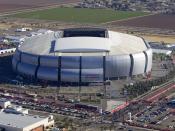Leadership is dynamic, ongoing, complex process facing many challenging events. Today's leaders must be equip with developing, engaging , and managing a diverse population (UOP, 2009). Transformational leadership raises the awareness of its followers. According toSarros and Santora (2001), transformational leadership raise the consciousness by appealing to higher ideas and values such as liberty, justice, peace, and equality. It raises the moral understanding and mutual respect of the leader and follower, which is the essence of the human factor. Both leader and follower have a shared, mutual purpose to raise the higher levels of motivating and supporting each other for a common goal or purpose.
Transactional leadership pursue a cost - benefit, economic exchange with followers (Sarros et al., 2001). In this system of exchange, a value is placed on something in return for another. Each person only recognize each other as just a person and each party is aware of the power and resources each bring to the bargaining table.
According to Wren (1995), transactional leadership does not bind leaders and followers together in a mutual and continuing pursuit of a higher purpose.
The styles of leadership in organizations depends on the organization. I work for the Department of Veteran Affairs (Veteran Hospital) and the leadership style used is mostly transactional. Within the federal ranks, the leadership style is a highly rank structured, political, and economical in nature. All departments within the VA are interrelated for a common purpose, to integrate all defense forces to support, care, and protect active duty and non-active duty veterans. That is similar to our mission statement. At the VA - hospital I work in, leadership is not very personable, not very visible, and part of the time they only interact with staff when an inspection from the Joint Commission of Hospital Accreditation is...


